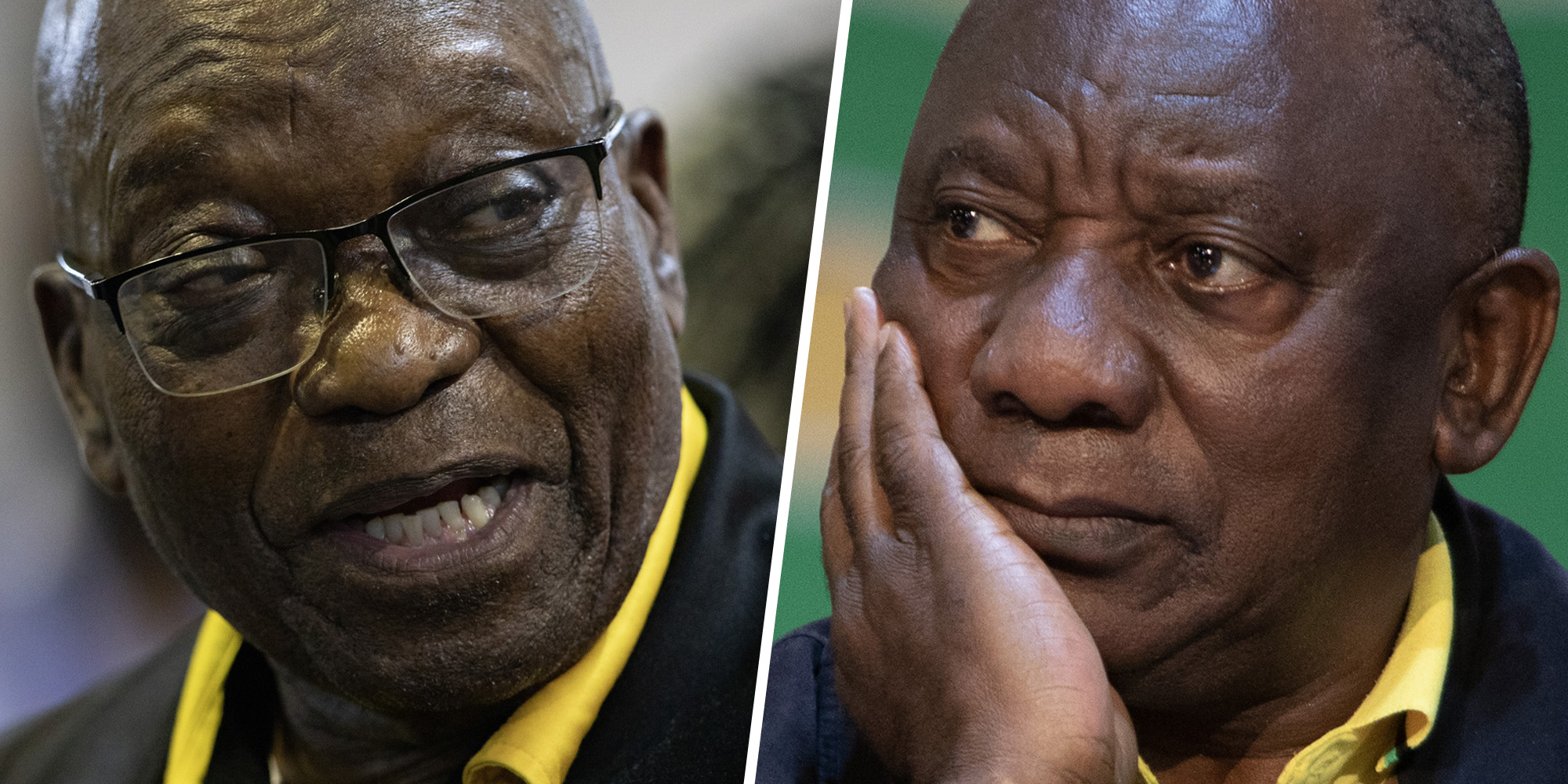President Cyril Ramaphosa has filed an affidavit in the high court in Johannesburg on Wednesday, 28 December, in support of an earlier motion that sought to interdict former head of state, Jacob Zuma, from further pursuing attempts to privately prosecute the newly re-elected leader of the ANC.
This is the latest strike in the legal exchanges between Ramaphosa and Zuma, the latter of whom faces several accusations regarding State Capture and recently launched another baffling legal battle.
Daily Maverick has previously reported that legal experts view Zuma’s attempted court action against Ramaphosa as nonsense.
Threats made, threats kept
A statement issued by the Jacob G Zuma Foundation on 15 December, the day prior to the start of the ANC’s National Elective Conference, is where the matter first started.
The statement announced that Ramaphosa “has been charged in a private prosecution with the criminal offence of being accessory after the fact in the crimes committed by among others Adv Downer namely, breaching the provisions if [sic] the NPA Act”.
Advocate Billy Downer, who is leading the prosecution of Zuma on corruption charges related to the Arms Deal, is the “Adv Downer” in reference.
Zuma is claiming that Downer and News24 journalist Karyn Maughan colluded to publish classified information on his medical status, in a separate court matter.
Zuma claims that he reported alleged prosecutorial misconduct on Downer’s part to Ramaphosa, but that Ramaphosa had failed to act and as a result is an “accessory after the fact”.
The presidency countered the following day, 16 December, stating that the charges “completely spurious and unfounded”.
Despite this, the Jacob G Zuma Foundation doubled down, releasing another statement that private prosecution attempts would go on.
“The Foundation notes sadly that President Ramaphosa and his team have not yet grasped the legal import and implications of the charges which he faces,” read the statement.
It was at this point that the presidency threatened to take legal action of their own to interdict Zuma to cease his attempted private prosecution of the president.
The five-page response letter was sent to Zuma’s lawyers from the State Attorney on 17 December, demanding that the “invalid summons” be withdrawn by Monday, 19 December and that failure to do so would result in Ramaphosa seeking “punitive costs”.
And that is precisely what Ramaphosa has done - gone to the courts.
Counter court
“I seek to interdict Mr Zuma from commencing and/or continuing the private prosecution,” states the president's application.
Furthermore, Ramphosa seeks to have the summons against him be declared unlawful and the private prosecution being driven by Zuma declared “unlawful, unconstitutional, invalid” and for it to be set aside.
Ramaphosa argues that the summonses against him are nullified by the absence of a nolle prosequi certificate.
“In accordance with the Criminal Procedure Act, a private prosecution can only be instituted after the individual prosecuting has obtained a certificate of non-prosecution [a nolle prosequi certificate],” presidential spokesperson Vincent Magwenya wrote earlier this month.
A later nolle prosequi certificate published by the Jacob G Zuma Foundation, issued to Zuma by the KwaZulu-Natal director of public prosecutions, Elaine Zungu, on 21 November, is also argued to be invalid. This is because the certificate does not refer to Ramaphosa and the charges do not relate to the president and thus “is void for vagueness”, states the filing.
The 21 November nolle prosequi is therefore “unlawful, unconstitutional and invalid” when applied in relation to the president, states the filing.
Furthermore, the Ramaphosa's affidavit disputes the legality of the summonses made by the Jacob G Zuma Foundation, arguing that two filings related to the same alleged offences will require the president to be in court on the same day - 19 January.
Ramaphosa argues that both summons cannot be applied if they both relate to the same alleged misdeeds and that if “Mr Zuma wished to withdraw the first summons and to replace it with the second summons, he should have first formally withdrawn the first summons before this Court on 19 January 2023 and then issue the new summons”.
Ramaphosa argues that the current summons is “procedurally irrational” and the second summons is invalid as long as the first remains in place. “This is unlawful and must result in both summonses being declared invalid and set aside,” he argues.
Ramaphosa also points out that there is no proof of a security deposit given to the registrar by Zuma when the summonses were issued and this too renders them unlawful.
Finally, Ramaphosa argues that private prosecution is being pursued due to ulterior motives by Zuma and is therefore in breach of the president's constitutional rights.
Those motives – if Ramaphosa had indeed been criminally charged, then, according to the ANC’s new electoral rules, he would have been ineligible to stand for election at the ANC’s electoral conference – that commenced the day after the initial statement that started this saga on 15 December – or have Ramaphosa step down as president due to pending criminal charges in accordance to the ANC’s step aside rule.
The application alleges that the attempted private prosecution is an abuse of power and that it “also constitutes a clear violation of [Ramaphosa’s] constitutional rights”. DM




